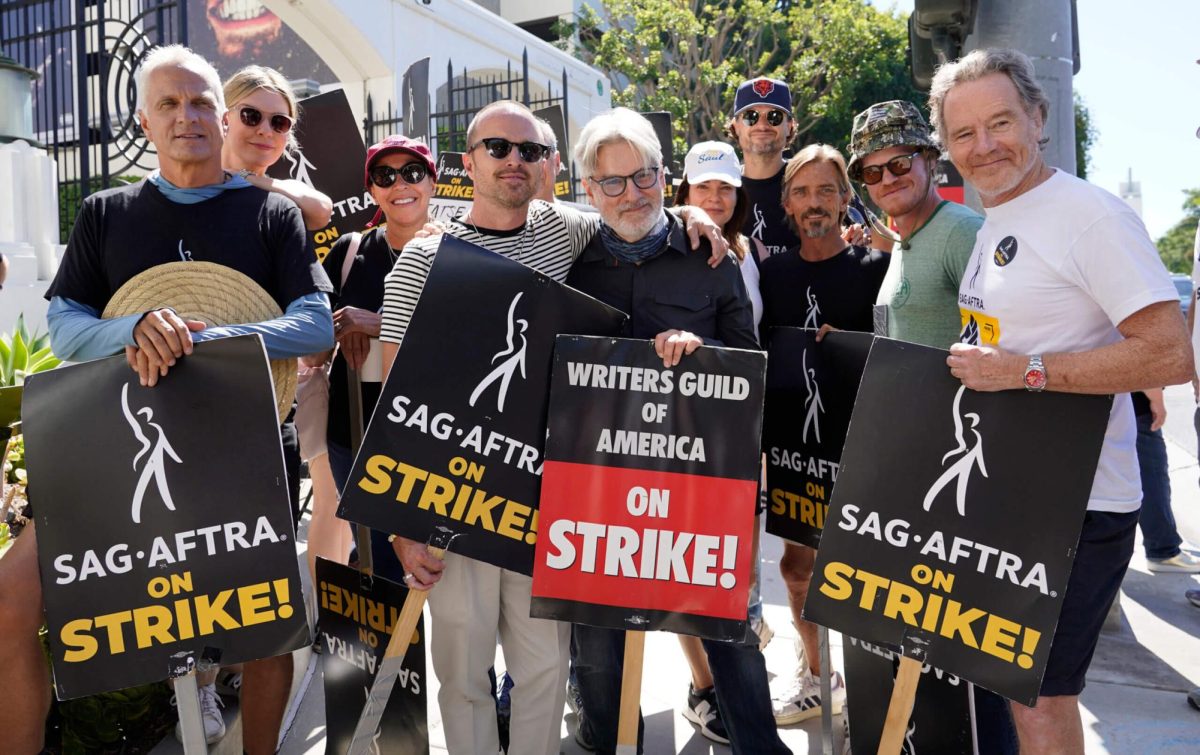When the American people end a stressful day at school or work, they find comfort in returning home to enjoy a film or television show. Entertainment is a crucial aspect of human culture, an artifact and reflection of the time period. The form of art a person is interested in can forge connections and communities. Yet the vast majority of people actually behind these productions are not compensated for their labor. Actors cannot create art without effective writing; screen writers cannot illustrate their ideas without moving performances. Without the people working in the wings, modern entertainment would entirely consist of substanceless plots and “unscripted” reality television.
On May 2nd, 2023, the Writers Guild of America West (WGA) went on strike. Their sister union, The Screen Actors Guild and American Federation of Television and Radio Artists (SAG-AFTRA) soon followed on July 14th. This was the first time in over 60 years that they had been on strike together. A few of the organizations’ most notable demands include an increase in wages due to the effect streaming has on compensation structure, regulation against artificial intelligence regarding threats to jobs, and an assured number of weeks of employment.
The strikes went into effect after the guild’s contract with the American Motion Picture and Television Producers (AMPTP) expired and they desired a renegotiation. The AMPTP represents Hollywood’s studios and production companies such as Netflix, NBC Universal, and Paramount/CBS. They have brought forward counter-offers, but neither the WGA’s nor SAG-AFTRA’s demands were met. A principal proposal denied by studios was a plan for actors and writers to obtain more income in streaming revenue due to the current business model rapidly transforming. The AMPTP commented that the unions are being disruptive and exacerbating challenges the industry is already facing. However, tensions have been rising for years. Waiting for a perfect and painless time to strike, that will never come, simply leads to no change. These enormous corporations, as SAG president Fran Drescher asserts, are pleading poverty when they make billions of dollars in streaming alone.
On September 27th, 148 days after writers put down their pens, the WGA leaders reached a preliminary agreement with the AMPTP and voted to end the strike. It is an incredible and prosperous win for the guild. The deal will be ratified by the union’s members with a vote that will take place from October 2nd to October 9th. Writers returning to work indicate that SAG-AFTRA’s picket lines will also dissipate soon.
The greatest misconception about SAG-AFTRA is that it is entirely composed of wealthy, A-list actors. Famous members help gain traction, but in actuality, the labor unions represent thousands of workers, including media professionals, news writers, and program hosts. Entertainers secure an initial paycheck while the production is filming, however, this is usually not sustainable without residuals. Residuals, or royalty payments, are how many workers can support themselves in the long term, or in between projects. They are negotiated by unions and paid when a piece of entertainment runs, or reruns, on broadcast and cable television, or a DVD is purchased after the release. The pressing issue is that, while streaming companies technically pay residuals, an innumerable amount of workers are essentially receiving pennies. On social media, actors and writers are transparently sharing their paychecks. Breaking Bad’s beloved actor of Jesse Pinkman, Aaron Paul, reported that he makes no money from the show streaming on Netflix. Others like Kimiko Glenn, an Orange is the New Black actress, have to work a second job in order to live. After appearing in 44 episodes, she only made $27 in total for foreign residuals, a number that she posted on TikTok. The lack of a steady income can mean the loss of union health insurance for members. The top ten percent of celebrities are likely as overpaid as their executive counterparts, but the people who primarily make up the unions are those who need it to succeed.
When picket lines are formed, it is disrespectful, and in some cases unwise to cross them. Scabbing, or crossing the picket line, can be done by both members of the strike and consumers. The WGA and SAG-AFTRA set certain guidelines that cannot be violated. These include doing work for productions affiliated with AMPTP, as well as taking part in premieres, giving interviews, or posting on social media regarding a current project. Fortunately, the unions are not currently calling for supporters to boycott any new media coming out. However, there is an intersection between social media and promotional work that influencers are having trouble navigating, especially those whose content is entirely dependent on reviewing new releases. The bottom line is that if influencers advertise entertainment properties for the AMPTP, they will be barred from joining the unions.
Consumers are concerned about how the strikes will impact their favorite TV shows and movies. There are both short and long-term consequences. The genre immediately affected was talk shows. They are timely, base their content around current events, and cannot produce new episodes without a writer’s room. Saturday Night Live, The Late Show with Stephen Colbert, and Jimmy Kimmel Live halted production and aired reruns when the strikes began. Since the WGA successfully negotiated a contract, talk shows have already recommenced. Other network shows will not be returning in the fall or have been postponed, such as Stranger Things, Abbott Elementary, and The Last of Us. Popular events such as ComicCon may be canceled due to the lack of actors able to participate. Movies will continue rolling in since their production times are longer, but box office giants like Deadpool 3 will be moved to a later release date. In the meantime, SAG-AFTRA launched its interim agreements program that allows independent productions with no direct ties to the AMPTP to continue filming. Luckily, smaller studios, including Lionsgate, A24, and independently financed films, are eligible. Original productions have the opportunity to flourish during this time.
The long term consequences of the writers’ and actors’ strike are still murky and uncertain. Major streaming platforms have ample upcoming productions and international media that they can continue to release, even if they cannot launch new projects. Given the streamers’ and Hollywood’s current position, the effects of the strikes would not be felt until further into the future, when scheduled series are incapable of starting production or debuting. The true lasting impact is strike recognition and worker solidarity. The WGA and SAG-AFTRA are not the only unions standing up against predominant U.S. industries. Victory for the writers and actors inspires other labor movements to obtain the rights and changes they deserve.



